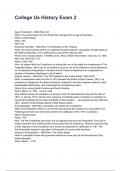College Us History Exam 2
Age of frustration - ANS-What: N/A
What: The period before the First World War changed into an age of frustration.
Where: United States.
When: N/A
Why: N/A
Alexander Hamilton - ANS-Who: First Secretary of the Treasury.
What: He recommended advent of a national financial institution, assumption of state debts by
the federal authorities, and a tariff device to pay off the national debt.
Where: born January eleven, 1755/fifty seven, Nevis, British West Indies—died July 12, 1804,
New York, New York, U.S.
When: 1789-1795
Why: He helped ratify the Constitution by writing fifty one of the eighty five installments of The
Federalist Papers, which can be nevertheless used as one of the maximum critical references
for Constitutional interpretation. Hamilton led the Treasury Department as a depended on
member of President Washington's first Cabinet.
Andrew Jackson - ANS-Who: The 7th President of the United States (1829-1837),
What: A widespread within the War of 1812 defeated the British at New Orleans (1815). As
president he antagonistic the Bank of America, objected to the right of person states to nullify
disagreeable federal laws, and accelerated the presidential powers.
Where: Born among North Carolina and South Carolina.
When: March 15, 1767 - June 8, 1845.
Why: Before turning into president, he served in both the Revolutionary War and the War of
1812. In January 1815, Jackson led a pressure of ordinarily green volunteers in opposition to
overwhelming British forces within the Battle of New Orleans. ... As president among 1829 and
1837, Jackson fundamentally altered United States politics.
Anti-Federalists - ANS-Who: individuals who hostile the Constitution
What: Anti-Federalism refers to a movement that adverse the creation of a more potent U.S.
Federal government and which later adverse the ratification of the 1787 Constitution.
Where: Rhode Island
When: 1787
Why: The Anti-Federalists have been not as organized because the Federalists. They did no
longer proportion one unified position at the proper form of presidency. However, they did unite
in their objection to the Constitution as it turned into proposed for ratification in 1787. The
Anti-Federalists argued in opposition to the growth of country wide electricity.
Articles of Confederation - ANS-Who: The United States
What:A vulnerable charter that governed America at some point of the Revolutionary War.
Where:Maryland
When: March 1, 1781
, Why: The Articles of Confederation were essentially an early version of america Constitution
that had been created as a governing settlement a few of the 13 original colonies/states to
combat the Revolution and establish a few confined federal electricity
Battle of New Orleans - ANS-Who: British troops led by means of General Edward Pakenham
and American forces led through General Andrew Jackson.
What: A struggle during the War of 1812 wherein the British military attempted to take New
Orleans. Due to the foolish frontal assault, Jackson defeated them, which gave him an great
popularity boost.
Where: New Orleans.
When: January 8, 1815.
Why: Because the decisive victory was accompanied rapidly in a while through information of a
peace treaty, many Americans on the time mistakenly believed the Battle of New Orleans had
received the battle. The Battle of New Orleans is likewise important because it propelled
Andrew Jackson to reputation as a battle hero.
Battle of Thames - ANS-Who: U.S. Victory over British and Indian forces in Ontario, Canada.
What: Fight wherein General Harrison defeated British forces in the Northwest.
Where: Delaware Nation at Moraviantown.
When: October 5, 1813.
Why: The Battle of the Thames turned into an important land struggle of the War of 1812 within
the American Northwest. Since the early 1800s, Tecumseh had sought to form a confederacy of
American Indian tribes to forestall Anglo-Americans from seizing American Indian land.
Tecumseh's demise marked the cease of Tecumseh's.
Battle of Tippecanoe - ANS-Who: Americans and Native Americans.
What: Battle among Americans and Native Americans. Tecumseh and the Prophet attempted to
oppress white agreement within the West, but defeated via William Henry Harrison. Led to
speak of Canadian invasion and served as a cause to the War of 1812.
Where: Battle Ground, IN
When: November 7, 1811
Why: Tenskwatawa worked together with his brother, Tecumseh, to unite American Indian tribes
in the Northwest Territory to guard themselves against white settlers. In 1811, the Battle of
Tippecanoe became a extensive defeat for Tecumseh's American Indian Confederation.
Bill of Rights - ANS-Who: James Madison
What: The first ten amendments to the Constitution
Where: Philadelphia turned into were the bill of rights turned into signed.
When: These 12 were approved on September 25, 1789 and sent to the states for ratification.
The 10 amendments which are now called the Bill of Rights have been ratified on December 15,
1791, for this reason becoming a part of the Constitution.
Why: It protects five of the maximum primary liberties. They are freedom of religion, freedom of
speech, freedom of the click, freedom of meeting, and freedom to petition the government to
right wrongs.
Constitutional Convention - ANS-Who: 55 delegates attended the Constitutional Convention
sessions, however only 39 truely signed the Constitution.
What: A assembly in Philadelphia in 1787 that produced a new charter.
Where: Philadelphia




